Leadership for Contemporary Organizations: A Detailed Report
VerifiedAdded on 2022/08/30
|10
|2709
|32
Report
AI Summary
This report provides a comprehensive analysis of Mark Zuckerberg's leadership, focusing on his skills, characteristics, and knowledge as CEO and founder of Facebook. It evaluates his equanimity, critical thinking, problem-solving abilities, and communication skills. The report explores Zuckerberg's past failures, such as the Yahoo buyout incident, and how these experiences influenced his leadership approach. It also examines the development of his leadership skills, differentiating between inborn and acquired qualities. Furthermore, the report identifies his transformational leadership style, highlighting his methods of motivating employees, fostering open communication, and creating a positive work environment. The conclusion emphasizes the importance of effective leadership in contemporary business and the lessons learned from Zuckerberg's journey.
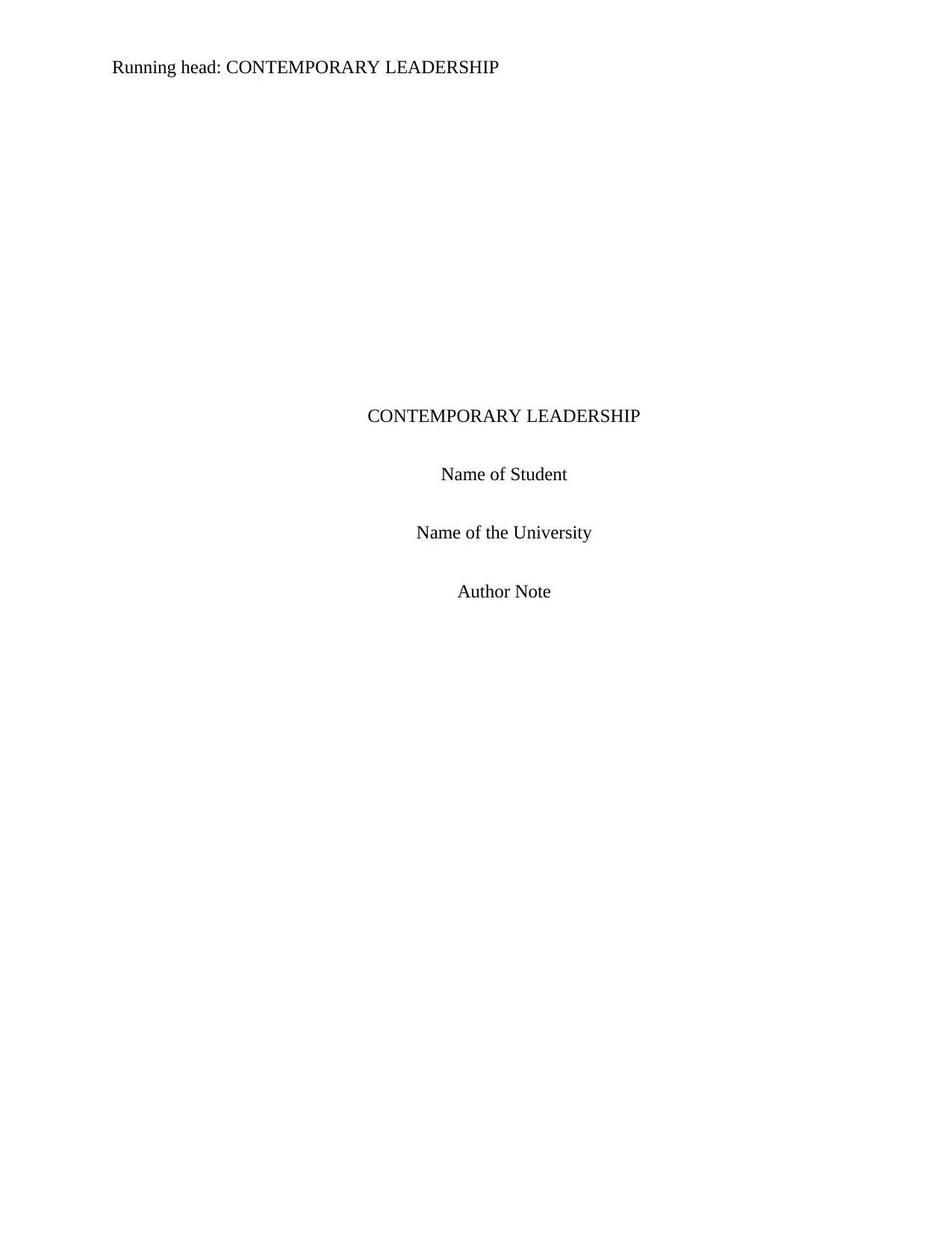
Running head: CONTEMPORARY LEADERSHIP
CONTEMPORARY LEADERSHIP
Name of Student
Name of the University
Author Note
CONTEMPORARY LEADERSHIP
Name of Student
Name of the University
Author Note
Paraphrase This Document
Need a fresh take? Get an instant paraphrase of this document with our AI Paraphraser
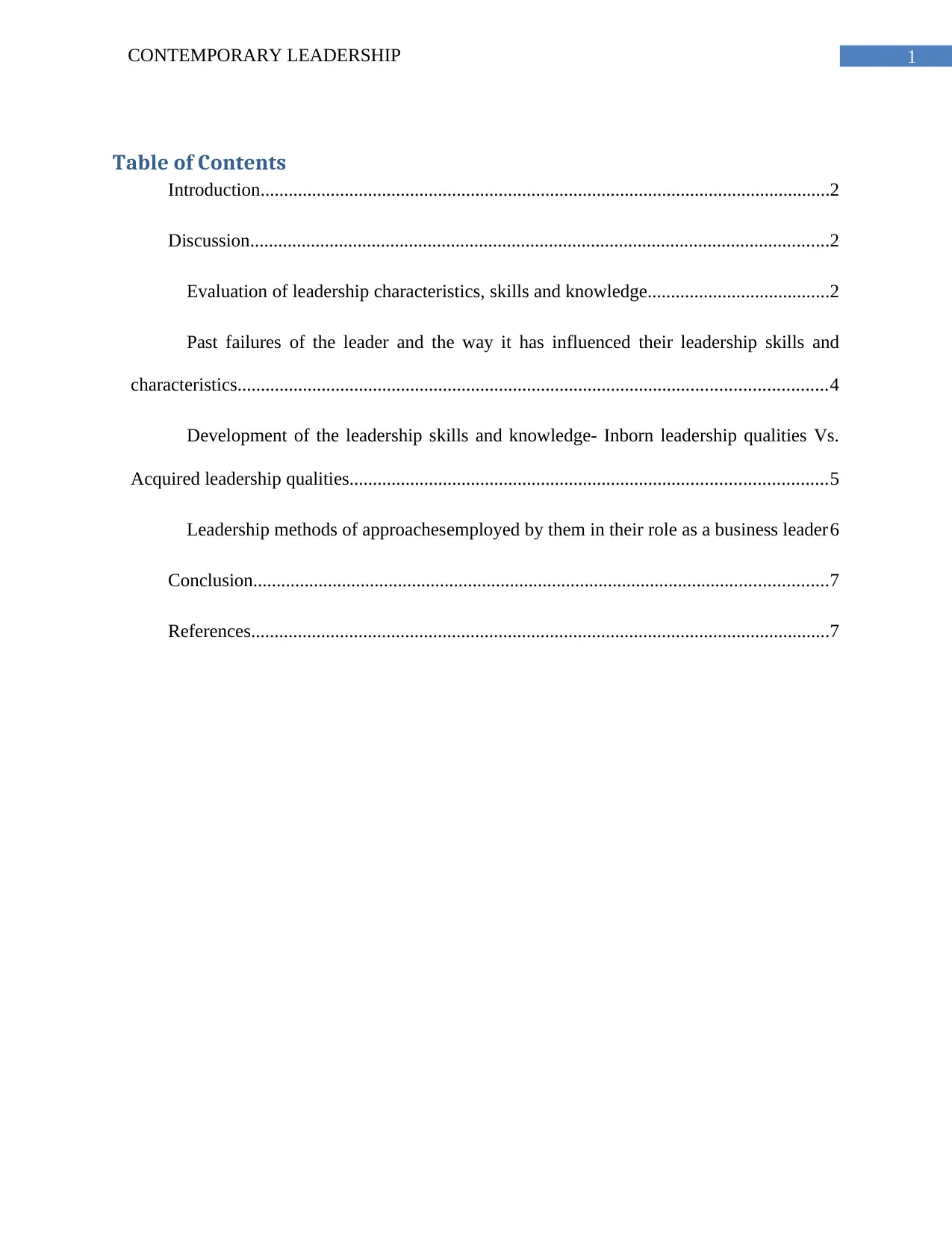
1CONTEMPORARY LEADERSHIP
Table of Contents
Introduction..........................................................................................................................2
Discussion............................................................................................................................2
Evaluation of leadership characteristics, skills and knowledge.......................................2
Past failures of the leader and the way it has influenced their leadership skills and
characteristics..............................................................................................................................4
Development of the leadership skills and knowledge- Inborn leadership qualities Vs.
Acquired leadership qualities......................................................................................................5
Leadership methods of approachesemployed by them in their role as a business leader6
Conclusion...........................................................................................................................7
References............................................................................................................................7
Table of Contents
Introduction..........................................................................................................................2
Discussion............................................................................................................................2
Evaluation of leadership characteristics, skills and knowledge.......................................2
Past failures of the leader and the way it has influenced their leadership skills and
characteristics..............................................................................................................................4
Development of the leadership skills and knowledge- Inborn leadership qualities Vs.
Acquired leadership qualities......................................................................................................5
Leadership methods of approachesemployed by them in their role as a business leader6
Conclusion...........................................................................................................................7
References............................................................................................................................7
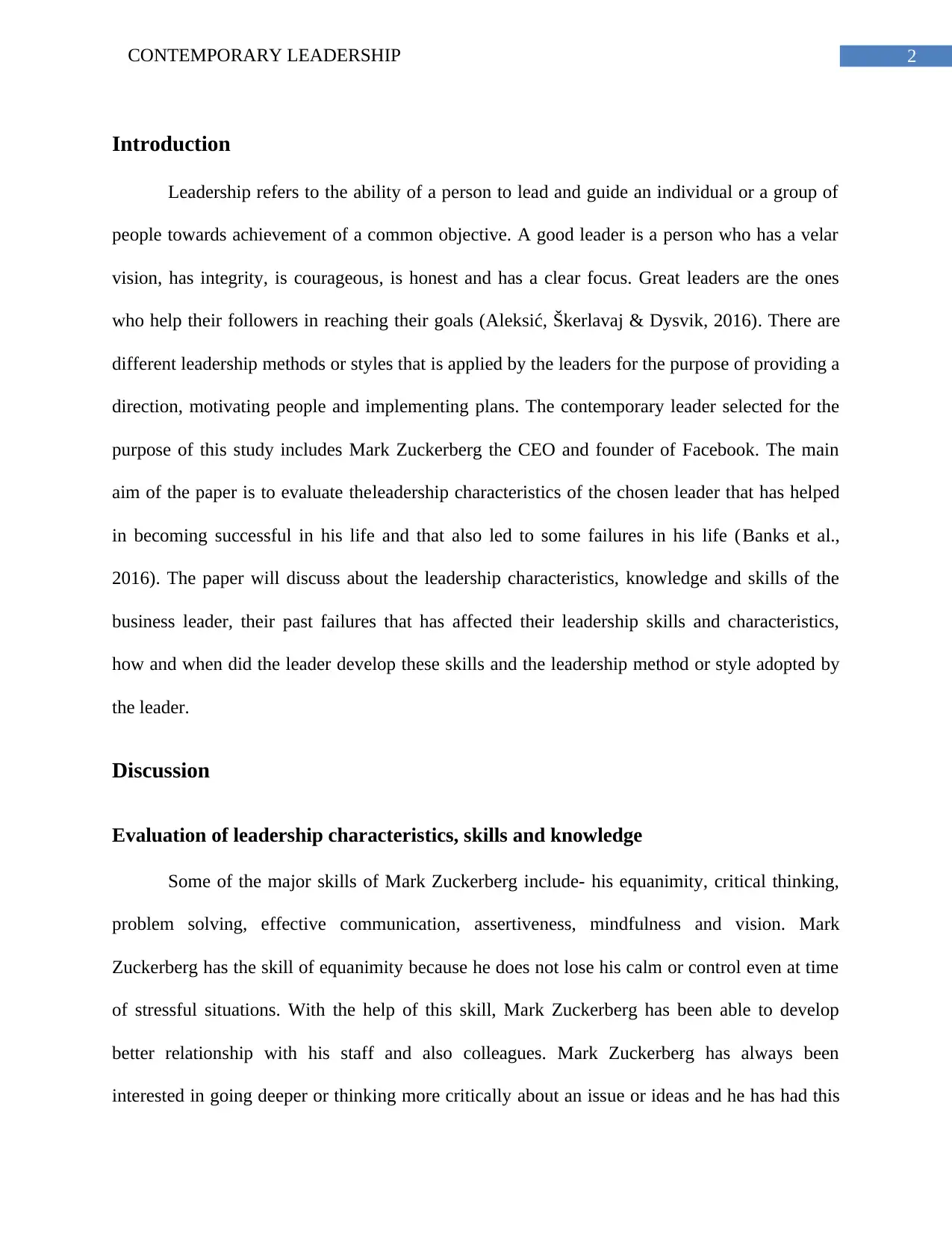
2CONTEMPORARY LEADERSHIP
Introduction
Leadership refers to the ability of a person to lead and guide an individual or a group of
people towards achievement of a common objective. A good leader is a person who has a velar
vision, has integrity, is courageous, is honest and has a clear focus. Great leaders are the ones
who help their followers in reaching their goals (Aleksić, Škerlavaj & Dysvik, 2016). There are
different leadership methods or styles that is applied by the leaders for the purpose of providing a
direction, motivating people and implementing plans. The contemporary leader selected for the
purpose of this study includes Mark Zuckerberg the CEO and founder of Facebook. The main
aim of the paper is to evaluate theleadership characteristics of the chosen leader that has helped
in becoming successful in his life and that also led to some failures in his life (Banks et al.,
2016). The paper will discuss about the leadership characteristics, knowledge and skills of the
business leader, their past failures that has affected their leadership skills and characteristics,
how and when did the leader develop these skills and the leadership method or style adopted by
the leader.
Discussion
Evaluation of leadership characteristics, skills and knowledge
Some of the major skills of Mark Zuckerberg include- his equanimity, critical thinking,
problem solving, effective communication, assertiveness, mindfulness and vision. Mark
Zuckerberg has the skill of equanimity because he does not lose his calm or control even at time
of stressful situations. With the help of this skill, Mark Zuckerberg has been able to develop
better relationship with his staff and also colleagues. Mark Zuckerberg has always been
interested in going deeper or thinking more critically about an issue or ideas and he has had this
Introduction
Leadership refers to the ability of a person to lead and guide an individual or a group of
people towards achievement of a common objective. A good leader is a person who has a velar
vision, has integrity, is courageous, is honest and has a clear focus. Great leaders are the ones
who help their followers in reaching their goals (Aleksić, Škerlavaj & Dysvik, 2016). There are
different leadership methods or styles that is applied by the leaders for the purpose of providing a
direction, motivating people and implementing plans. The contemporary leader selected for the
purpose of this study includes Mark Zuckerberg the CEO and founder of Facebook. The main
aim of the paper is to evaluate theleadership characteristics of the chosen leader that has helped
in becoming successful in his life and that also led to some failures in his life (Banks et al.,
2016). The paper will discuss about the leadership characteristics, knowledge and skills of the
business leader, their past failures that has affected their leadership skills and characteristics,
how and when did the leader develop these skills and the leadership method or style adopted by
the leader.
Discussion
Evaluation of leadership characteristics, skills and knowledge
Some of the major skills of Mark Zuckerberg include- his equanimity, critical thinking,
problem solving, effective communication, assertiveness, mindfulness and vision. Mark
Zuckerberg has the skill of equanimity because he does not lose his calm or control even at time
of stressful situations. With the help of this skill, Mark Zuckerberg has been able to develop
better relationship with his staff and also colleagues. Mark Zuckerberg has always been
interested in going deeper or thinking more critically about an issue or ideas and he has had this
⊘ This is a preview!⊘
Do you want full access?
Subscribe today to unlock all pages.

Trusted by 1+ million students worldwide
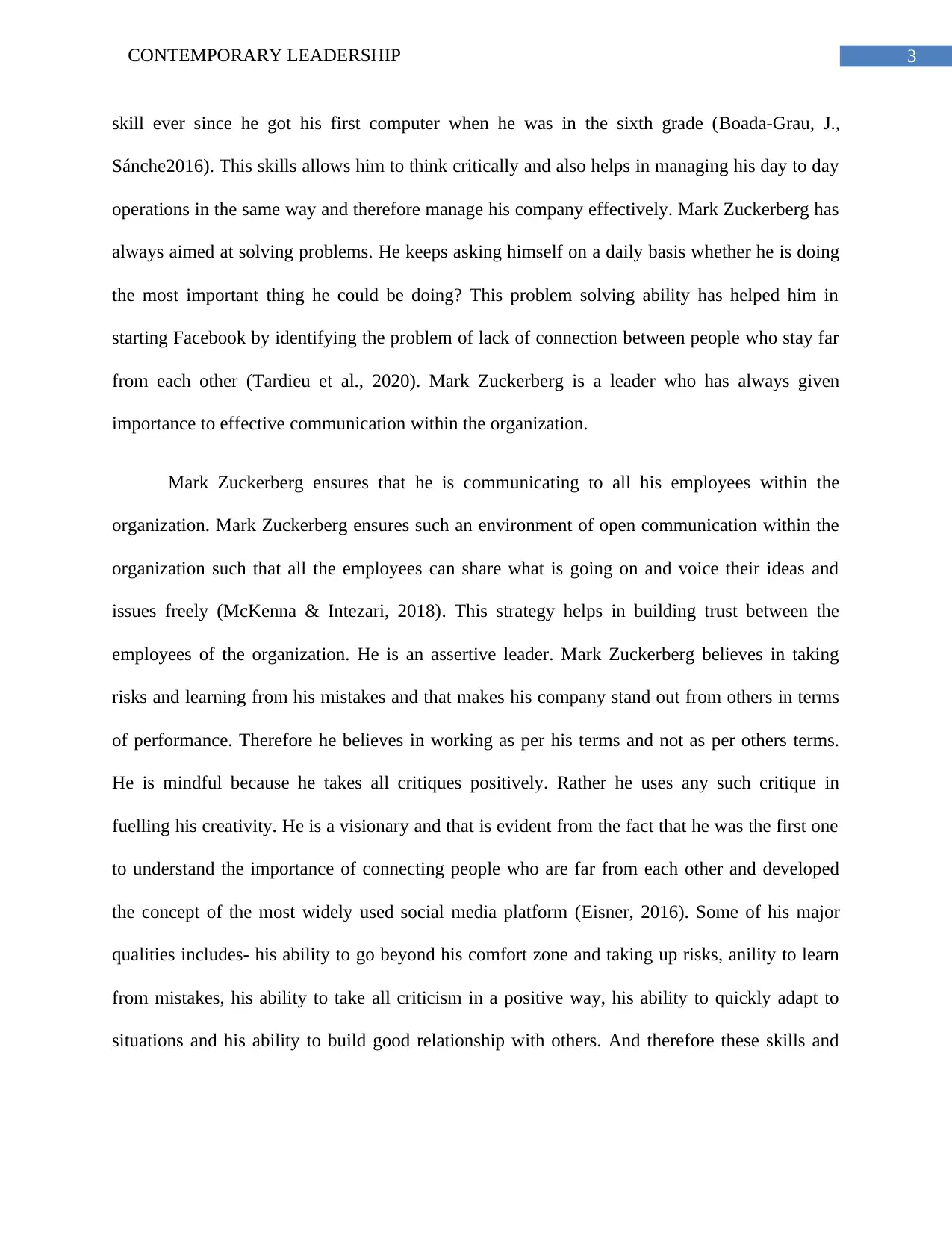
3CONTEMPORARY LEADERSHIP
skill ever since he got his first computer when he was in the sixth grade (Boada-Grau, J.,
Sánche2016). This skills allows him to think critically and also helps in managing his day to day
operations in the same way and therefore manage his company effectively. Mark Zuckerberg has
always aimed at solving problems. He keeps asking himself on a daily basis whether he is doing
the most important thing he could be doing? This problem solving ability has helped him in
starting Facebook by identifying the problem of lack of connection between people who stay far
from each other (Tardieu et al., 2020). Mark Zuckerberg is a leader who has always given
importance to effective communication within the organization.
Mark Zuckerberg ensures that he is communicating to all his employees within the
organization. Mark Zuckerberg ensures such an environment of open communication within the
organization such that all the employees can share what is going on and voice their ideas and
issues freely (McKenna & Intezari, 2018). This strategy helps in building trust between the
employees of the organization. He is an assertive leader. Mark Zuckerberg believes in taking
risks and learning from his mistakes and that makes his company stand out from others in terms
of performance. Therefore he believes in working as per his terms and not as per others terms.
He is mindful because he takes all critiques positively. Rather he uses any such critique in
fuelling his creativity. He is a visionary and that is evident from the fact that he was the first one
to understand the importance of connecting people who are far from each other and developed
the concept of the most widely used social media platform (Eisner, 2016). Some of his major
qualities includes- his ability to go beyond his comfort zone and taking up risks, anility to learn
from mistakes, his ability to take all criticism in a positive way, his ability to quickly adapt to
situations and his ability to build good relationship with others. And therefore these skills and
skill ever since he got his first computer when he was in the sixth grade (Boada-Grau, J.,
Sánche2016). This skills allows him to think critically and also helps in managing his day to day
operations in the same way and therefore manage his company effectively. Mark Zuckerberg has
always aimed at solving problems. He keeps asking himself on a daily basis whether he is doing
the most important thing he could be doing? This problem solving ability has helped him in
starting Facebook by identifying the problem of lack of connection between people who stay far
from each other (Tardieu et al., 2020). Mark Zuckerberg is a leader who has always given
importance to effective communication within the organization.
Mark Zuckerberg ensures that he is communicating to all his employees within the
organization. Mark Zuckerberg ensures such an environment of open communication within the
organization such that all the employees can share what is going on and voice their ideas and
issues freely (McKenna & Intezari, 2018). This strategy helps in building trust between the
employees of the organization. He is an assertive leader. Mark Zuckerberg believes in taking
risks and learning from his mistakes and that makes his company stand out from others in terms
of performance. Therefore he believes in working as per his terms and not as per others terms.
He is mindful because he takes all critiques positively. Rather he uses any such critique in
fuelling his creativity. He is a visionary and that is evident from the fact that he was the first one
to understand the importance of connecting people who are far from each other and developed
the concept of the most widely used social media platform (Eisner, 2016). Some of his major
qualities includes- his ability to go beyond his comfort zone and taking up risks, anility to learn
from mistakes, his ability to take all criticism in a positive way, his ability to quickly adapt to
situations and his ability to build good relationship with others. And therefore these skills and
Paraphrase This Document
Need a fresh take? Get an instant paraphrase of this document with our AI Paraphraser
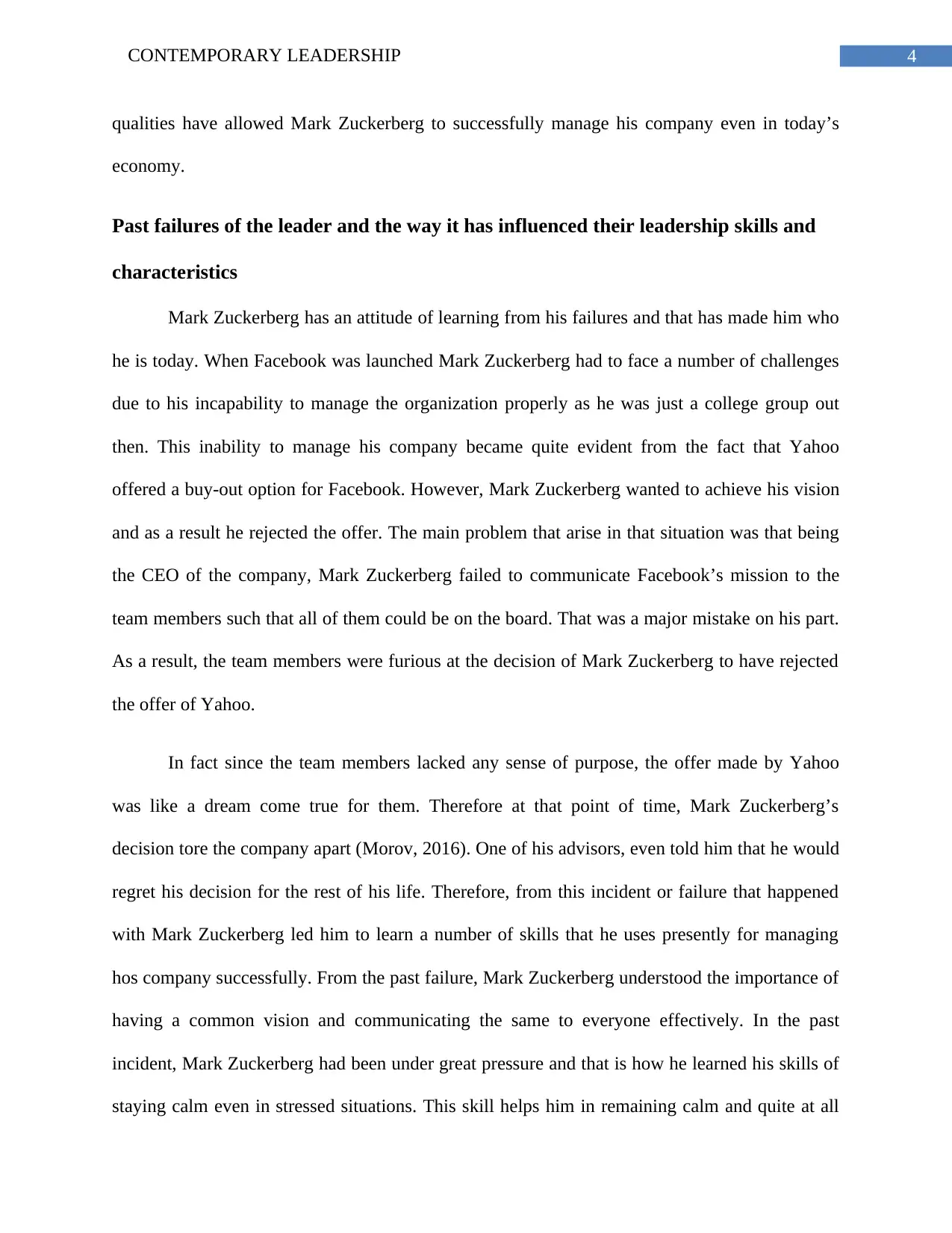
4CONTEMPORARY LEADERSHIP
qualities have allowed Mark Zuckerberg to successfully manage his company even in today’s
economy.
Past failures of the leader and the way it has influenced their leadership skills and
characteristics
Mark Zuckerberg has an attitude of learning from his failures and that has made him who
he is today. When Facebook was launched Mark Zuckerberg had to face a number of challenges
due to his incapability to manage the organization properly as he was just a college group out
then. This inability to manage his company became quite evident from the fact that Yahoo
offered a buy-out option for Facebook. However, Mark Zuckerberg wanted to achieve his vision
and as a result he rejected the offer. The main problem that arise in that situation was that being
the CEO of the company, Mark Zuckerberg failed to communicate Facebook’s mission to the
team members such that all of them could be on the board. That was a major mistake on his part.
As a result, the team members were furious at the decision of Mark Zuckerberg to have rejected
the offer of Yahoo.
In fact since the team members lacked any sense of purpose, the offer made by Yahoo
was like a dream come true for them. Therefore at that point of time, Mark Zuckerberg’s
decision tore the company apart (Morov, 2016). One of his advisors, even told him that he would
regret his decision for the rest of his life. Therefore, from this incident or failure that happened
with Mark Zuckerberg led him to learn a number of skills that he uses presently for managing
hos company successfully. From the past failure, Mark Zuckerberg understood the importance of
having a common vision and communicating the same to everyone effectively. In the past
incident, Mark Zuckerberg had been under great pressure and that is how he learned his skills of
staying calm even in stressed situations. This skill helps him in remaining calm and quite at all
qualities have allowed Mark Zuckerberg to successfully manage his company even in today’s
economy.
Past failures of the leader and the way it has influenced their leadership skills and
characteristics
Mark Zuckerberg has an attitude of learning from his failures and that has made him who
he is today. When Facebook was launched Mark Zuckerberg had to face a number of challenges
due to his incapability to manage the organization properly as he was just a college group out
then. This inability to manage his company became quite evident from the fact that Yahoo
offered a buy-out option for Facebook. However, Mark Zuckerberg wanted to achieve his vision
and as a result he rejected the offer. The main problem that arise in that situation was that being
the CEO of the company, Mark Zuckerberg failed to communicate Facebook’s mission to the
team members such that all of them could be on the board. That was a major mistake on his part.
As a result, the team members were furious at the decision of Mark Zuckerberg to have rejected
the offer of Yahoo.
In fact since the team members lacked any sense of purpose, the offer made by Yahoo
was like a dream come true for them. Therefore at that point of time, Mark Zuckerberg’s
decision tore the company apart (Morov, 2016). One of his advisors, even told him that he would
regret his decision for the rest of his life. Therefore, from this incident or failure that happened
with Mark Zuckerberg led him to learn a number of skills that he uses presently for managing
hos company successfully. From the past failure, Mark Zuckerberg understood the importance of
having a common vision and communicating the same to everyone effectively. In the past
incident, Mark Zuckerberg had been under great pressure and that is how he learned his skills of
staying calm even in stressed situations. This skill helps him in remaining calm and quite at all
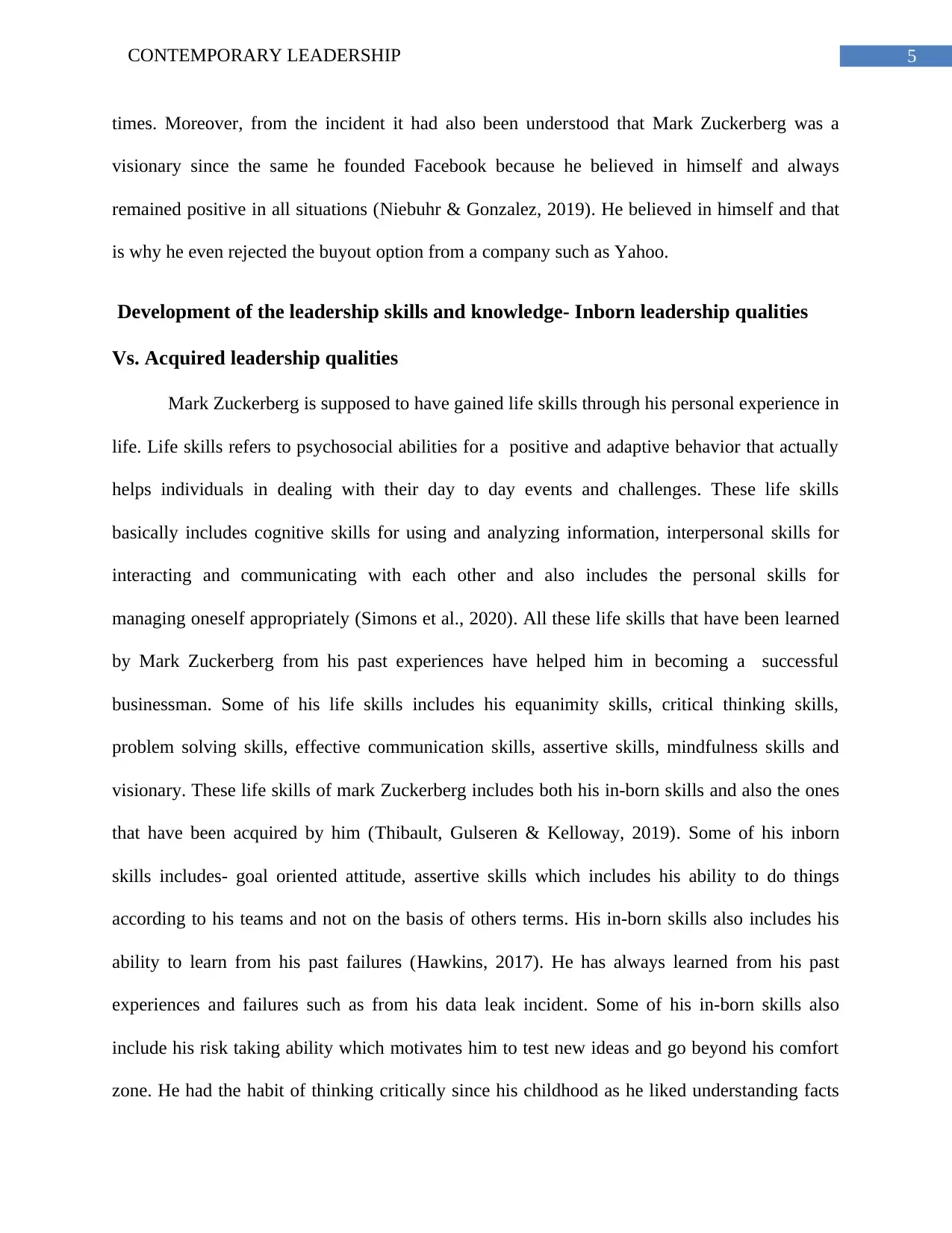
5CONTEMPORARY LEADERSHIP
times. Moreover, from the incident it had also been understood that Mark Zuckerberg was a
visionary since the same he founded Facebook because he believed in himself and always
remained positive in all situations (Niebuhr & Gonzalez, 2019). He believed in himself and that
is why he even rejected the buyout option from a company such as Yahoo.
Development of the leadership skills and knowledge- Inborn leadership qualities
Vs. Acquired leadership qualities
Mark Zuckerberg is supposed to have gained life skills through his personal experience in
life. Life skills refers to psychosocial abilities for a positive and adaptive behavior that actually
helps individuals in dealing with their day to day events and challenges. These life skills
basically includes cognitive skills for using and analyzing information, interpersonal skills for
interacting and communicating with each other and also includes the personal skills for
managing oneself appropriately (Simons et al., 2020). All these life skills that have been learned
by Mark Zuckerberg from his past experiences have helped him in becoming a successful
businessman. Some of his life skills includes his equanimity skills, critical thinking skills,
problem solving skills, effective communication skills, assertive skills, mindfulness skills and
visionary. These life skills of mark Zuckerberg includes both his in-born skills and also the ones
that have been acquired by him (Thibault, Gulseren & Kelloway, 2019). Some of his inborn
skills includes- goal oriented attitude, assertive skills which includes his ability to do things
according to his teams and not on the basis of others terms. His in-born skills also includes his
ability to learn from his past failures (Hawkins, 2017). He has always learned from his past
experiences and failures such as from his data leak incident. Some of his in-born skills also
include his risk taking ability which motivates him to test new ideas and go beyond his comfort
zone. He had the habit of thinking critically since his childhood as he liked understanding facts
times. Moreover, from the incident it had also been understood that Mark Zuckerberg was a
visionary since the same he founded Facebook because he believed in himself and always
remained positive in all situations (Niebuhr & Gonzalez, 2019). He believed in himself and that
is why he even rejected the buyout option from a company such as Yahoo.
Development of the leadership skills and knowledge- Inborn leadership qualities
Vs. Acquired leadership qualities
Mark Zuckerberg is supposed to have gained life skills through his personal experience in
life. Life skills refers to psychosocial abilities for a positive and adaptive behavior that actually
helps individuals in dealing with their day to day events and challenges. These life skills
basically includes cognitive skills for using and analyzing information, interpersonal skills for
interacting and communicating with each other and also includes the personal skills for
managing oneself appropriately (Simons et al., 2020). All these life skills that have been learned
by Mark Zuckerberg from his past experiences have helped him in becoming a successful
businessman. Some of his life skills includes his equanimity skills, critical thinking skills,
problem solving skills, effective communication skills, assertive skills, mindfulness skills and
visionary. These life skills of mark Zuckerberg includes both his in-born skills and also the ones
that have been acquired by him (Thibault, Gulseren & Kelloway, 2019). Some of his inborn
skills includes- goal oriented attitude, assertive skills which includes his ability to do things
according to his teams and not on the basis of others terms. His in-born skills also includes his
ability to learn from his past failures (Hawkins, 2017). He has always learned from his past
experiences and failures such as from his data leak incident. Some of his in-born skills also
include his risk taking ability which motivates him to test new ideas and go beyond his comfort
zone. He had the habit of thinking critically since his childhood as he liked understanding facts
⊘ This is a preview!⊘
Do you want full access?
Subscribe today to unlock all pages.

Trusted by 1+ million students worldwide
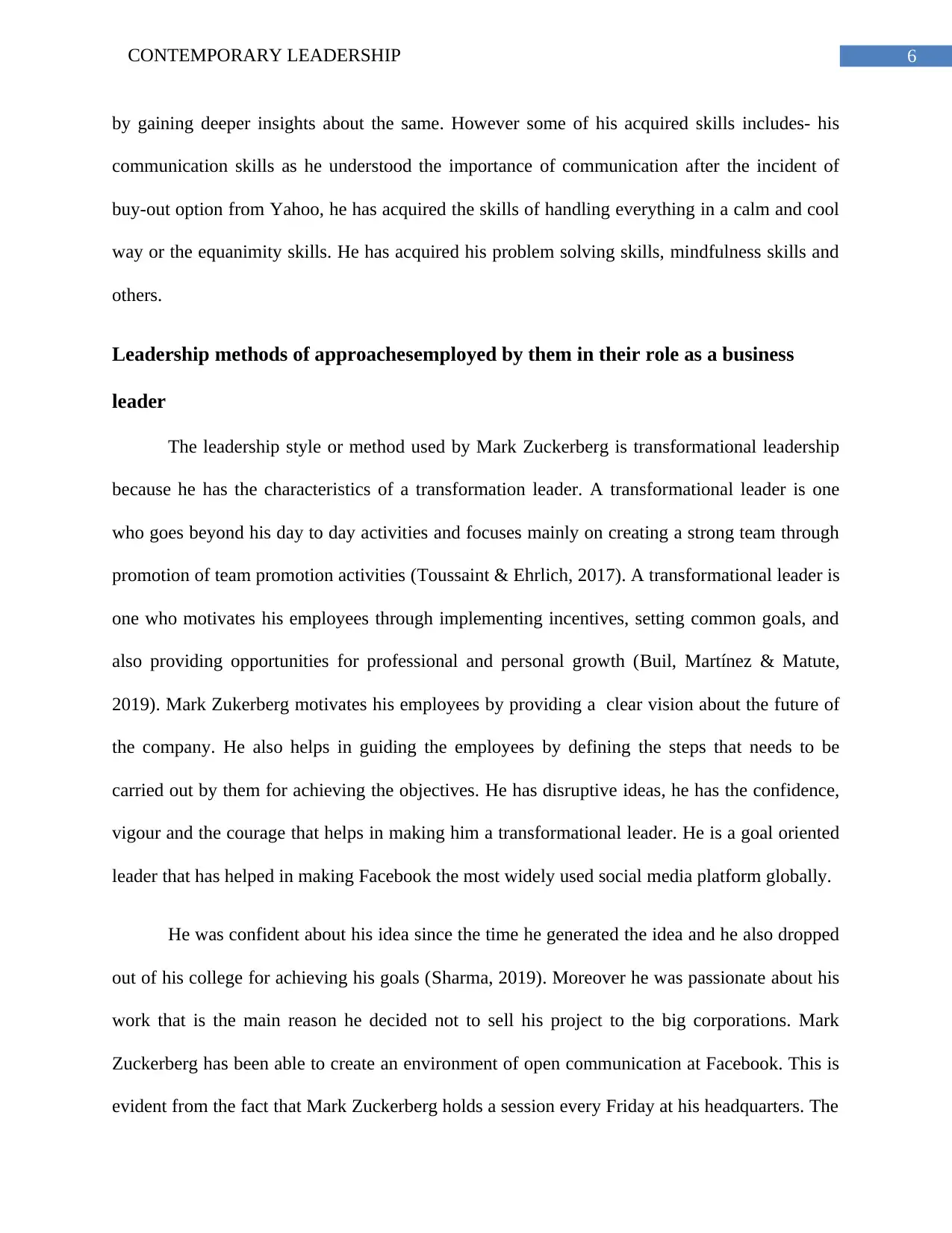
6CONTEMPORARY LEADERSHIP
by gaining deeper insights about the same. However some of his acquired skills includes- his
communication skills as he understood the importance of communication after the incident of
buy-out option from Yahoo, he has acquired the skills of handling everything in a calm and cool
way or the equanimity skills. He has acquired his problem solving skills, mindfulness skills and
others.
Leadership methods of approachesemployed by them in their role as a business
leader
The leadership style or method used by Mark Zuckerberg is transformational leadership
because he has the characteristics of a transformation leader. A transformational leader is one
who goes beyond his day to day activities and focuses mainly on creating a strong team through
promotion of team promotion activities (Toussaint & Ehrlich, 2017). A transformational leader is
one who motivates his employees through implementing incentives, setting common goals, and
also providing opportunities for professional and personal growth (Buil, Martínez & Matute,
2019). Mark Zukerberg motivates his employees by providing a clear vision about the future of
the company. He also helps in guiding the employees by defining the steps that needs to be
carried out by them for achieving the objectives. He has disruptive ideas, he has the confidence,
vigour and the courage that helps in making him a transformational leader. He is a goal oriented
leader that has helped in making Facebook the most widely used social media platform globally.
He was confident about his idea since the time he generated the idea and he also dropped
out of his college for achieving his goals (Sharma, 2019). Moreover he was passionate about his
work that is the main reason he decided not to sell his project to the big corporations. Mark
Zuckerberg has been able to create an environment of open communication at Facebook. This is
evident from the fact that Mark Zuckerberg holds a session every Friday at his headquarters. The
by gaining deeper insights about the same. However some of his acquired skills includes- his
communication skills as he understood the importance of communication after the incident of
buy-out option from Yahoo, he has acquired the skills of handling everything in a calm and cool
way or the equanimity skills. He has acquired his problem solving skills, mindfulness skills and
others.
Leadership methods of approachesemployed by them in their role as a business
leader
The leadership style or method used by Mark Zuckerberg is transformational leadership
because he has the characteristics of a transformation leader. A transformational leader is one
who goes beyond his day to day activities and focuses mainly on creating a strong team through
promotion of team promotion activities (Toussaint & Ehrlich, 2017). A transformational leader is
one who motivates his employees through implementing incentives, setting common goals, and
also providing opportunities for professional and personal growth (Buil, Martínez & Matute,
2019). Mark Zukerberg motivates his employees by providing a clear vision about the future of
the company. He also helps in guiding the employees by defining the steps that needs to be
carried out by them for achieving the objectives. He has disruptive ideas, he has the confidence,
vigour and the courage that helps in making him a transformational leader. He is a goal oriented
leader that has helped in making Facebook the most widely used social media platform globally.
He was confident about his idea since the time he generated the idea and he also dropped
out of his college for achieving his goals (Sharma, 2019). Moreover he was passionate about his
work that is the main reason he decided not to sell his project to the big corporations. Mark
Zuckerberg has been able to create an environment of open communication at Facebook. This is
evident from the fact that Mark Zuckerberg holds a session every Friday at his headquarters. The
Paraphrase This Document
Need a fresh take? Get an instant paraphrase of this document with our AI Paraphraser
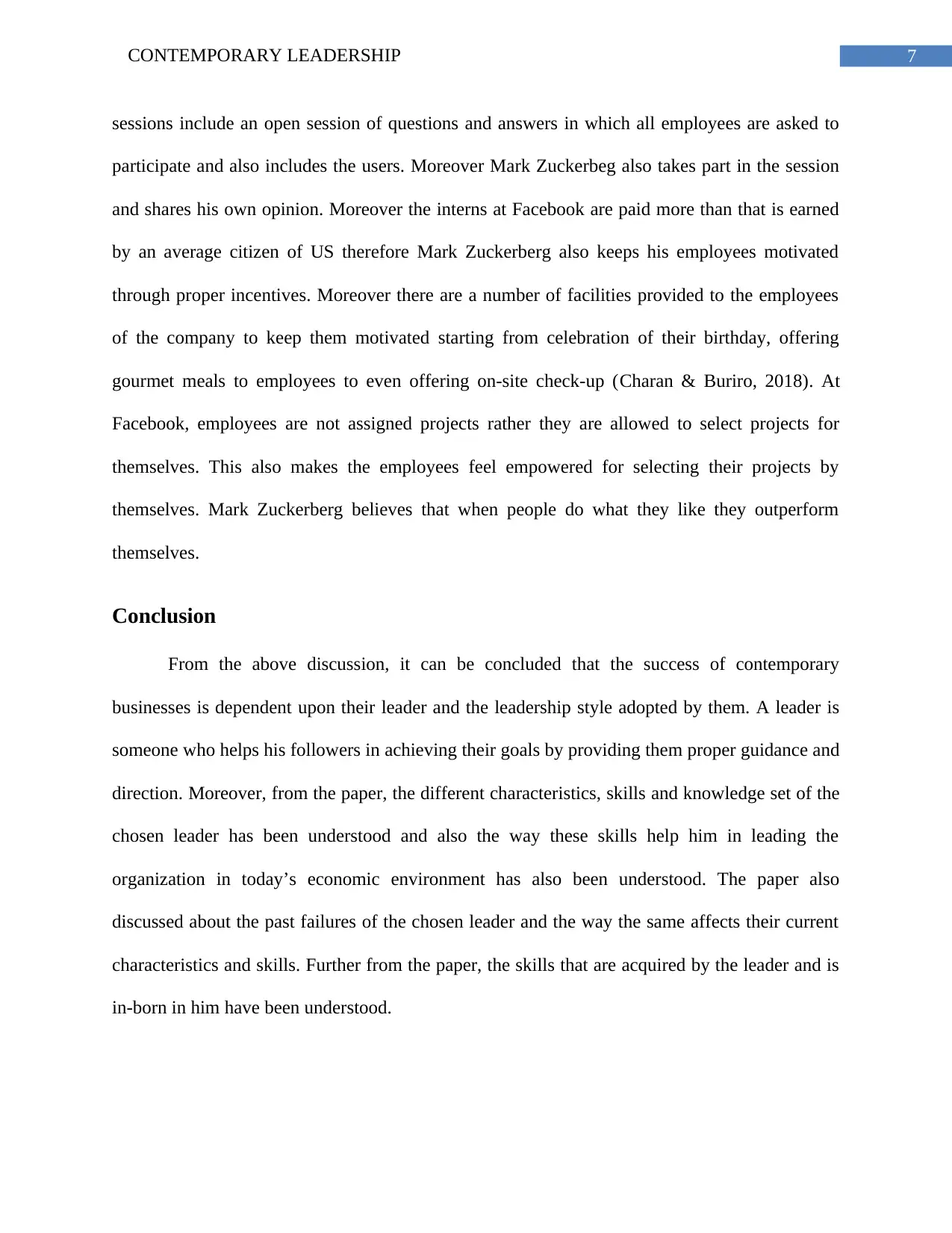
7CONTEMPORARY LEADERSHIP
sessions include an open session of questions and answers in which all employees are asked to
participate and also includes the users. Moreover Mark Zuckerbeg also takes part in the session
and shares his own opinion. Moreover the interns at Facebook are paid more than that is earned
by an average citizen of US therefore Mark Zuckerberg also keeps his employees motivated
through proper incentives. Moreover there are a number of facilities provided to the employees
of the company to keep them motivated starting from celebration of their birthday, offering
gourmet meals to employees to even offering on-site check-up (Charan & Buriro, 2018). At
Facebook, employees are not assigned projects rather they are allowed to select projects for
themselves. This also makes the employees feel empowered for selecting their projects by
themselves. Mark Zuckerberg believes that when people do what they like they outperform
themselves.
Conclusion
From the above discussion, it can be concluded that the success of contemporary
businesses is dependent upon their leader and the leadership style adopted by them. A leader is
someone who helps his followers in achieving their goals by providing them proper guidance and
direction. Moreover, from the paper, the different characteristics, skills and knowledge set of the
chosen leader has been understood and also the way these skills help him in leading the
organization in today’s economic environment has also been understood. The paper also
discussed about the past failures of the chosen leader and the way the same affects their current
characteristics and skills. Further from the paper, the skills that are acquired by the leader and is
in-born in him have been understood.
sessions include an open session of questions and answers in which all employees are asked to
participate and also includes the users. Moreover Mark Zuckerbeg also takes part in the session
and shares his own opinion. Moreover the interns at Facebook are paid more than that is earned
by an average citizen of US therefore Mark Zuckerberg also keeps his employees motivated
through proper incentives. Moreover there are a number of facilities provided to the employees
of the company to keep them motivated starting from celebration of their birthday, offering
gourmet meals to employees to even offering on-site check-up (Charan & Buriro, 2018). At
Facebook, employees are not assigned projects rather they are allowed to select projects for
themselves. This also makes the employees feel empowered for selecting their projects by
themselves. Mark Zuckerberg believes that when people do what they like they outperform
themselves.
Conclusion
From the above discussion, it can be concluded that the success of contemporary
businesses is dependent upon their leader and the leadership style adopted by them. A leader is
someone who helps his followers in achieving their goals by providing them proper guidance and
direction. Moreover, from the paper, the different characteristics, skills and knowledge set of the
chosen leader has been understood and also the way these skills help him in leading the
organization in today’s economic environment has also been understood. The paper also
discussed about the past failures of the chosen leader and the way the same affects their current
characteristics and skills. Further from the paper, the skills that are acquired by the leader and is
in-born in him have been understood.
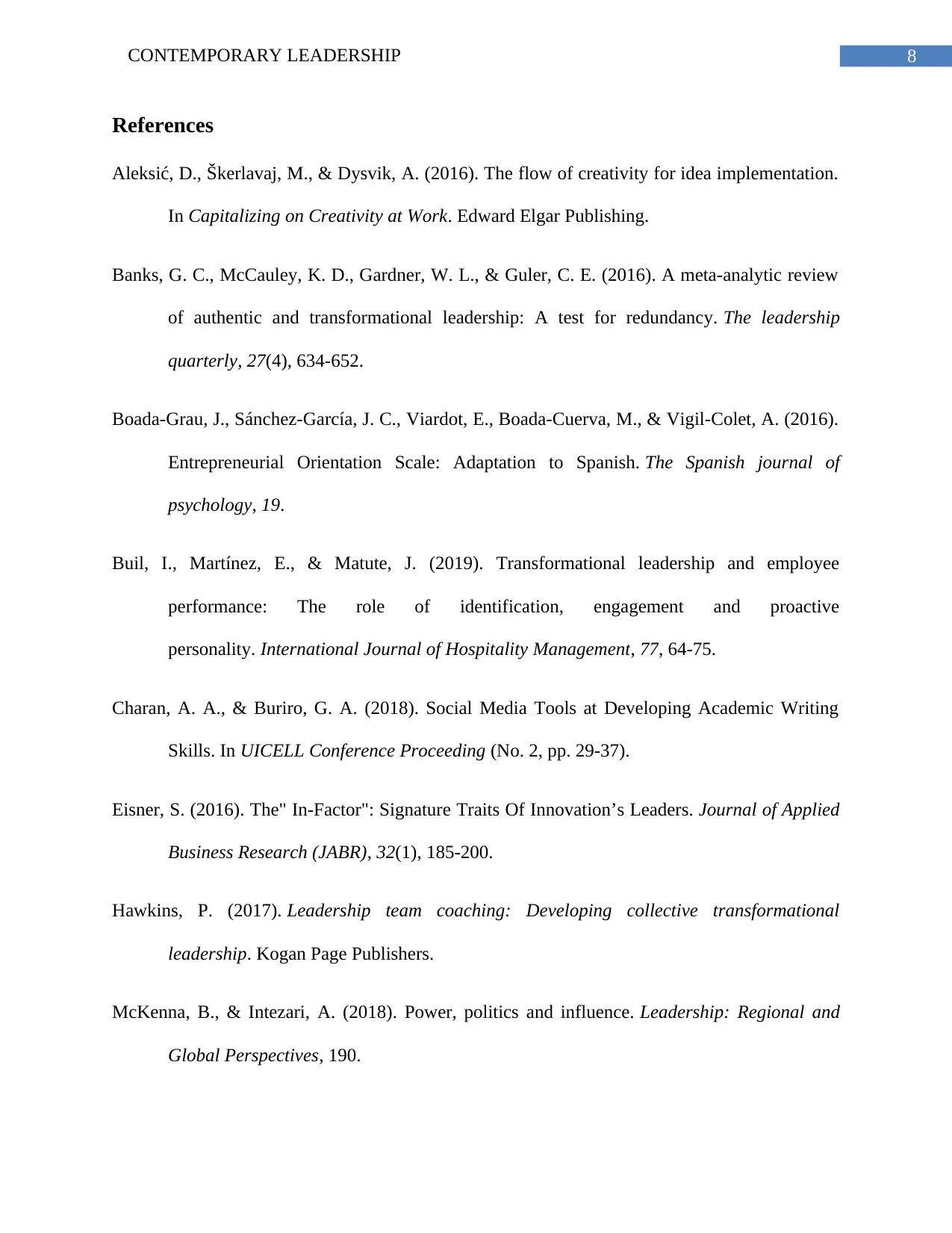
8CONTEMPORARY LEADERSHIP
References
Aleksić, D., Škerlavaj, M., & Dysvik, A. (2016). The flow of creativity for idea implementation.
In Capitalizing on Creativity at Work. Edward Elgar Publishing.
Banks, G. C., McCauley, K. D., Gardner, W. L., & Guler, C. E. (2016). A meta-analytic review
of authentic and transformational leadership: A test for redundancy. The leadership
quarterly, 27(4), 634-652.
Boada-Grau, J., Sánchez-García, J. C., Viardot, E., Boada-Cuerva, M., & Vigil-Colet, A. (2016).
Entrepreneurial Orientation Scale: Adaptation to Spanish. The Spanish journal of
psychology, 19.
Buil, I., Martínez, E., & Matute, J. (2019). Transformational leadership and employee
performance: The role of identification, engagement and proactive
personality. International Journal of Hospitality Management, 77, 64-75.
Charan, A. A., & Buriro, G. A. (2018). Social Media Tools at Developing Academic Writing
Skills. In UICELL Conference Proceeding (No. 2, pp. 29-37).
Eisner, S. (2016). The" In-Factor": Signature Traits Of Innovation’s Leaders. Journal of Applied
Business Research (JABR), 32(1), 185-200.
Hawkins, P. (2017). Leadership team coaching: Developing collective transformational
leadership. Kogan Page Publishers.
McKenna, B., & Intezari, A. (2018). Power, politics and influence. Leadership: Regional and
Global Perspectives, 190.
References
Aleksić, D., Škerlavaj, M., & Dysvik, A. (2016). The flow of creativity for idea implementation.
In Capitalizing on Creativity at Work. Edward Elgar Publishing.
Banks, G. C., McCauley, K. D., Gardner, W. L., & Guler, C. E. (2016). A meta-analytic review
of authentic and transformational leadership: A test for redundancy. The leadership
quarterly, 27(4), 634-652.
Boada-Grau, J., Sánchez-García, J. C., Viardot, E., Boada-Cuerva, M., & Vigil-Colet, A. (2016).
Entrepreneurial Orientation Scale: Adaptation to Spanish. The Spanish journal of
psychology, 19.
Buil, I., Martínez, E., & Matute, J. (2019). Transformational leadership and employee
performance: The role of identification, engagement and proactive
personality. International Journal of Hospitality Management, 77, 64-75.
Charan, A. A., & Buriro, G. A. (2018). Social Media Tools at Developing Academic Writing
Skills. In UICELL Conference Proceeding (No. 2, pp. 29-37).
Eisner, S. (2016). The" In-Factor": Signature Traits Of Innovation’s Leaders. Journal of Applied
Business Research (JABR), 32(1), 185-200.
Hawkins, P. (2017). Leadership team coaching: Developing collective transformational
leadership. Kogan Page Publishers.
McKenna, B., & Intezari, A. (2018). Power, politics and influence. Leadership: Regional and
Global Perspectives, 190.
⊘ This is a preview!⊘
Do you want full access?
Subscribe today to unlock all pages.

Trusted by 1+ million students worldwide
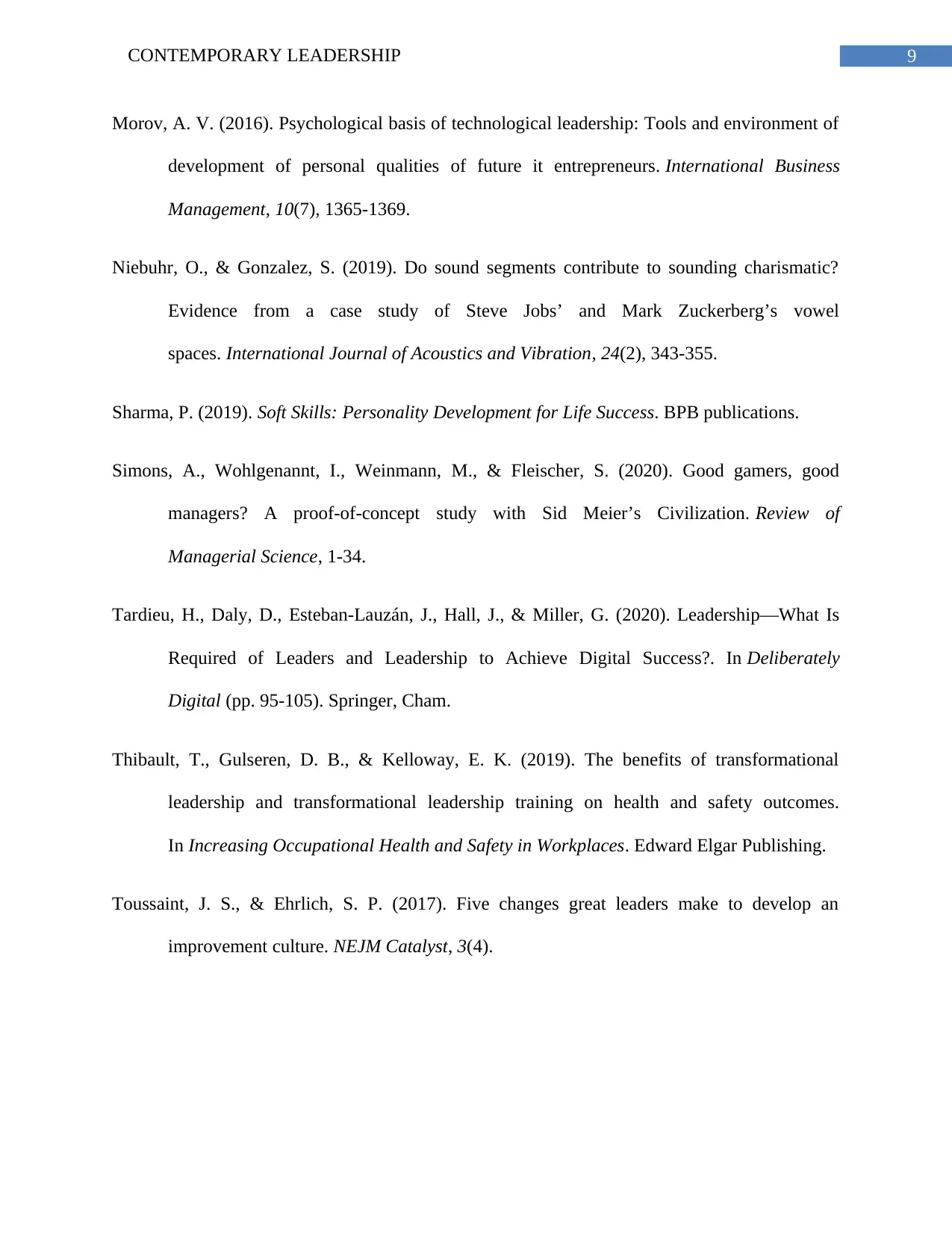
9CONTEMPORARY LEADERSHIP
Morov, A. V. (2016). Psychological basis of technological leadership: Tools and environment of
development of personal qualities of future it entrepreneurs. International Business
Management, 10(7), 1365-1369.
Niebuhr, O., & Gonzalez, S. (2019). Do sound segments contribute to sounding charismatic?
Evidence from a case study of Steve Jobs’ and Mark Zuckerberg’s vowel
spaces. International Journal of Acoustics and Vibration, 24(2), 343-355.
Sharma, P. (2019). Soft Skills: Personality Development for Life Success. BPB publications.
Simons, A., Wohlgenannt, I., Weinmann, M., & Fleischer, S. (2020). Good gamers, good
managers? A proof-of-concept study with Sid Meier’s Civilization. Review of
Managerial Science, 1-34.
Tardieu, H., Daly, D., Esteban-Lauzán, J., Hall, J., & Miller, G. (2020). Leadership—What Is
Required of Leaders and Leadership to Achieve Digital Success?. In Deliberately
Digital (pp. 95-105). Springer, Cham.
Thibault, T., Gulseren, D. B., & Kelloway, E. K. (2019). The benefits of transformational
leadership and transformational leadership training on health and safety outcomes.
In Increasing Occupational Health and Safety in Workplaces. Edward Elgar Publishing.
Toussaint, J. S., & Ehrlich, S. P. (2017). Five changes great leaders make to develop an
improvement culture. NEJM Catalyst, 3(4).
Morov, A. V. (2016). Psychological basis of technological leadership: Tools and environment of
development of personal qualities of future it entrepreneurs. International Business
Management, 10(7), 1365-1369.
Niebuhr, O., & Gonzalez, S. (2019). Do sound segments contribute to sounding charismatic?
Evidence from a case study of Steve Jobs’ and Mark Zuckerberg’s vowel
spaces. International Journal of Acoustics and Vibration, 24(2), 343-355.
Sharma, P. (2019). Soft Skills: Personality Development for Life Success. BPB publications.
Simons, A., Wohlgenannt, I., Weinmann, M., & Fleischer, S. (2020). Good gamers, good
managers? A proof-of-concept study with Sid Meier’s Civilization. Review of
Managerial Science, 1-34.
Tardieu, H., Daly, D., Esteban-Lauzán, J., Hall, J., & Miller, G. (2020). Leadership—What Is
Required of Leaders and Leadership to Achieve Digital Success?. In Deliberately
Digital (pp. 95-105). Springer, Cham.
Thibault, T., Gulseren, D. B., & Kelloway, E. K. (2019). The benefits of transformational
leadership and transformational leadership training on health and safety outcomes.
In Increasing Occupational Health and Safety in Workplaces. Edward Elgar Publishing.
Toussaint, J. S., & Ehrlich, S. P. (2017). Five changes great leaders make to develop an
improvement culture. NEJM Catalyst, 3(4).
1 out of 10
Related Documents
Your All-in-One AI-Powered Toolkit for Academic Success.
+13062052269
info@desklib.com
Available 24*7 on WhatsApp / Email
![[object Object]](/_next/static/media/star-bottom.7253800d.svg)
Unlock your academic potential
Copyright © 2020–2026 A2Z Services. All Rights Reserved. Developed and managed by ZUCOL.




